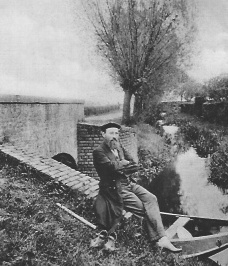Emanuel Felke
Emanuel Felke (1856–1926) was a German Lutheran pastor and naturopath who is known as the "Father of Complex Homeopathy." He combined elements of homeopathy, phytotherapy (herbal medicine), hydrotherapy (water therapy), and diet in his treatments, which came to be known as the Felke Cure. His approach to natural healing has influenced the field of naturopathy and continues to be practiced in some parts of the world today.
Biography[edit | edit source]
Emanuel Felke was born on February 7, 1856, in Kläden, Saxony-Anhalt, Germany. He studied theology and became a Lutheran pastor, but his interest in natural healing methods led him to also study homeopathy. Felke believed that disease was the result of impurities in the body and that healing could be achieved through natural means that cleansed and revitalized the body.
Throughout his life, Felke sought to integrate his spiritual beliefs with his natural healing practices. He argued that true healing must consider the body, mind, and spirit, an approach that was innovative at the time and laid the groundwork for holistic health practices.
Felke Cure[edit | edit source]
The Felke Cure, developed by Emanuel Felke, is a holistic treatment method that includes four main components:
1. **Homeopathy**: Felke used specially prepared homeopathic remedies to treat various ailments. He is particularly noted for his development of complex homeopathic remedies, which combine several homeopathic substances in one treatment.
2. **Phytotherapy**: Felke also made extensive use of herbal medicines, believing in their power to heal and detoxify the body.
3. **Hydrotherapy**: Water treatments, including baths, showers, and wraps, were another cornerstone of the Felke Cure. Felke believed in the healing properties of water and its ability to remove toxins from the body.
4. **Diet**: A specific diet was recommended as part of the Felke Cure, focusing on simplicity and natural foods to support the body's healing processes.
In addition to these four components, Felke also recommended physical exercises and outdoor activities to strengthen the body and spirit.
Legacy[edit | edit source]
Emanuel Felke's contributions to natural healing have left a lasting legacy. The Felke Cure is still practiced in some wellness centers and natural health clinics, particularly in Germany. His holistic approach to health, emphasizing the integration of body, mind, and spirit, has influenced contemporary holistic and naturopathic medicine.
Felke's methods have also contributed to the development of complex homeopathy, a branch of homeopathy that uses multi-component remedies, which remains a subject of interest among homeopathic practitioners today.
Criticism and Controversy[edit | edit source]
Like many alternative healing practices, the Felke Cure and complex homeopathy have faced criticism from the mainstream medical community. Critics argue that there is a lack of scientific evidence supporting the efficacy of these methods. Despite this, many people continue to seek out Felke's methods as part of their health and wellness routines.
See Also[edit | edit source]
Search WikiMD
Ad.Tired of being Overweight? Try W8MD's NYC physician weight loss.
Semaglutide (Ozempic / Wegovy and Tirzepatide (Mounjaro / Zepbound) available. Call 718 946 5500.
Advertise on WikiMD
|
WikiMD's Wellness Encyclopedia |
| Let Food Be Thy Medicine Medicine Thy Food - Hippocrates |
Translate this page: - East Asian
中文,
日本,
한국어,
South Asian
हिन्दी,
தமிழ்,
తెలుగు,
Urdu,
ಕನ್ನಡ,
Southeast Asian
Indonesian,
Vietnamese,
Thai,
မြန်မာဘာသာ,
বাংলা
European
español,
Deutsch,
français,
Greek,
português do Brasil,
polski,
română,
русский,
Nederlands,
norsk,
svenska,
suomi,
Italian
Middle Eastern & African
عربى,
Turkish,
Persian,
Hebrew,
Afrikaans,
isiZulu,
Kiswahili,
Other
Bulgarian,
Hungarian,
Czech,
Swedish,
മലയാളം,
मराठी,
ਪੰਜਾਬੀ,
ગુજરાતી,
Portuguese,
Ukrainian
Medical Disclaimer: WikiMD is not a substitute for professional medical advice. The information on WikiMD is provided as an information resource only, may be incorrect, outdated or misleading, and is not to be used or relied on for any diagnostic or treatment purposes. Please consult your health care provider before making any healthcare decisions or for guidance about a specific medical condition. WikiMD expressly disclaims responsibility, and shall have no liability, for any damages, loss, injury, or liability whatsoever suffered as a result of your reliance on the information contained in this site. By visiting this site you agree to the foregoing terms and conditions, which may from time to time be changed or supplemented by WikiMD. If you do not agree to the foregoing terms and conditions, you should not enter or use this site. See full disclaimer.
Credits:Most images are courtesy of Wikimedia commons, and templates, categories Wikipedia, licensed under CC BY SA or similar.
Contributors: Prab R. Tumpati, MD



